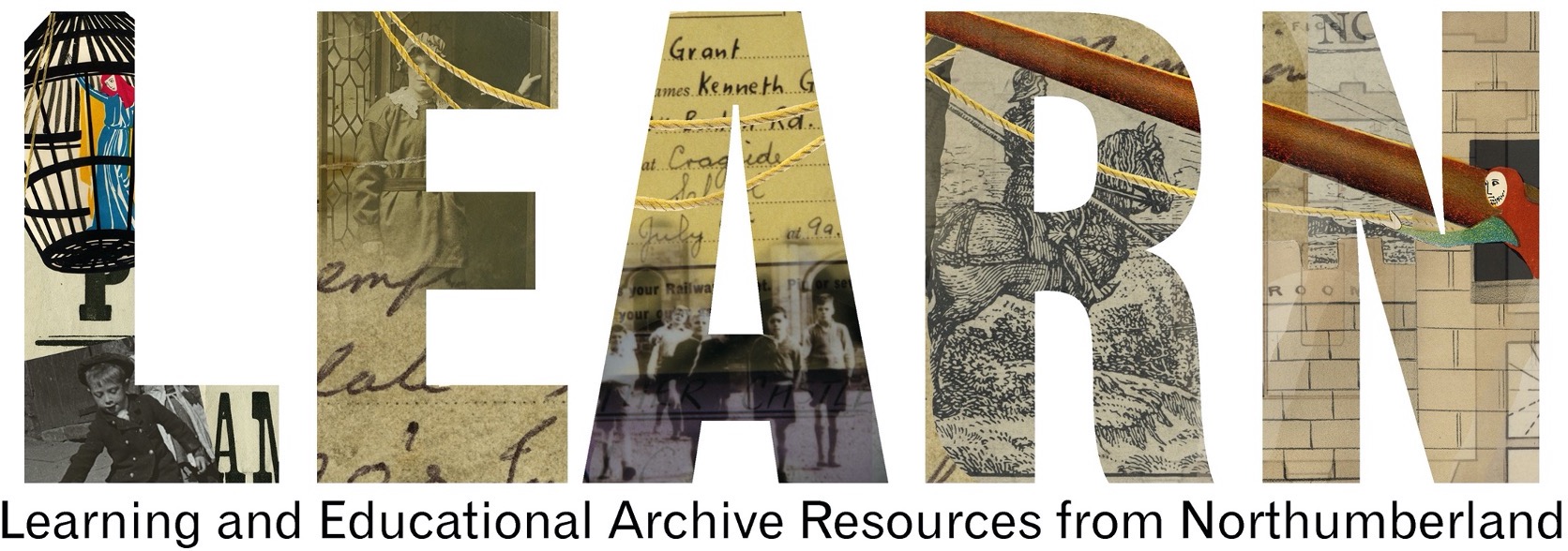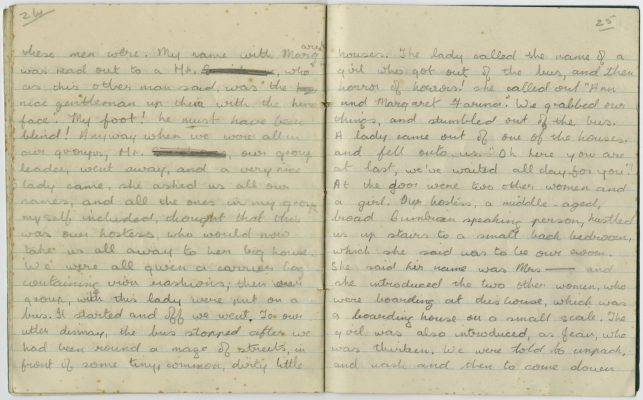Diary of Ann Helen Farina, August/September 1939
Reference: NRO/07896/B/1
Suggested age groups: KS1, KS2, KS3, KS4, Lifelong Learners
Subject areas: WW2
CONTEXT
Ann Farina was a school girl in Gosforth when the Second World War broke out. She attended Newcastle Central High School for Girls and was evacuated to Keswick along with the rest of the school.
In this diary she describes how she found out about being evacuated while returning from her family holiday in Scotland. The family rushed home to get Ann and her sister Margaret back to school on 1 September to be evacuated (pages 1-8). She comments on the fact that there are lots of soldiers travelling by train and describes some of the soldiers on her train singing in the corridors. (Pages 7-8).
Ann describes how the girls are organised when they get to school (pages 14-17), the train journey (page 17-21) and arriving in Keswick (21-25). Despite being very tired and hungry, the children have to sit through a long speech (page 23).
She goes into detail about the boarding house (the “billets” – she uses the army term, here) where she and her sister have been placed (page 25-onwards). She is not impressed with the lack of electricity and inside bathroom (page 25-27). Ann is also unimpressed with her hosts. On page 29 she records that she wrote a letter to her mother, once they arrived. She tells her mother that they are happy – “which I was not!”
Throughout, she talks about the food that she was given and often talks about “rashions” (rations), even though rationing was not introduced until 1940.
ACTIVITIES
ACTIVITY 1
Background
Ann Farina was a school girl in Gosforth when the Second World War broke out. She attended Newcastle Central High School for Girls and was evacuated to Keswick along with the rest of the school.
SEE
See: Who is Ann Farina?
See: Where did Ann live before she was evacuated?
See: Where did Ann go to school?
See: Where were Ann and her family when they found out they needed to return home so that the children could be evacuated?
See: Which town was Ann evacuated to?
See: Who was Ann evacuated with?
See: What type of building does Ann’s host live in?
THINK
Think: What impression does the diary give you of Ann?
Think: How old did you think Ann was after reading her diary? Does she come across as the age she is, older or younger?
Think: What do you think Ann’s life was like before being evacuated? Can you tell what her social class was?
Think: Are there any parts of the diary entry that might suggest that the boarding house Ann was evacuated to was very different to what she was used to at home?
Think: How do you think Ann felt about being evacuated?
Think: Why did Ann write to her mother saying that she was happy when she was not?
Think: What was rationing?
Think: Why might Ann have mentioned rationing if it had not yet been introduced?
DO
Do: Write a letter as though you are Ann to her mother to tell her about your journey and arrival in Keswick. Think about Ann telling her mother that she was happy when she was not, will you be entirely truthful in your letter?
Do: Imagine you are being evacuated and sent far away from your family to an unfamiliar place very different to what you are used to. Write a diary entry about what you might be feeling or thinking.
Do: Do you think evacuation had a social impact on Britain? In groups debate how evacuation impacted British views on social class.
Do: What else led to social change during the Second World War? Create a presentation highlighting evacuation and one other aspect of the Second World War that led to social change.
Resources
ACTIVITY 2
Background
In this diary she describes how she found out about being evacuated while returning from her family holiday in Scotland. The family rushed home to get Ann and her sister Margaret back to school on 1 September to be evacuated (pages 1-8). She comments on the fact that there are lots of soldiers travelling by train and describes some of the soldiers on her train singing in the corridors. (Pages 7-8).
SEE
See: When was Ann evacuated?
See: Where was Ann evacuated from?
See: Where was Ann evacuated to?
See: How did Ann and her classmates travel to Keswick?
See: Who else does Ann mention was travelling on the train?
THINK
Think: What is significant about the date Ann was evacuated on?
Think: Why were children evacuated during the Second World War?
Think: Who else, other than children, were evacuated during the Second World War?
Think: What types of areas were people evacuated from?
Think: What types of areas were people evacuated to?
Think: What types of factors were taken into consideration when deciding where children were evacuated from and where they were taken to?
Think: Do you think it was a good idea to evacuate the children from Gosforth to Keswick?
Think: Why might the soldiers have been singing?
Think: What types of songs might the soldiers have sung?
DO
Do: Using a map, plot out the route Ann’s train may have taken on her evacuation journey.
Do: Do you live in an area that people would have been evacuated to or from? Take a survey of the people around you to find out the most popular answer. Plot the answers on a bar chart.
Do: Can you find evidence online of people being evacuated to or from your area?
Do: Can you find any evidence online of Gosforth or Keswick being bombed? You could use the data gathered by the Bombing Britain website. Use this to help you consider if it was a good idea to evacuate the children from Gosforth to Keswick.
Do: As a group, listen to and sing some wartime songs. How does the music make you feel? How does it affect your mood? How might it have made the soldiers feel?
Do: Can you write your own song as though you are a group of soldiers travelling to war?
Do: Create a presentation showing some popular forms of entertainment during the war and discuss why music and entertainment was important to morale.
Resources
https://www.chroniclelive.co.uk/news/history/north-east-memories-day-world-11816858
https://www.iwm.org.uk/history/the-evacuated-children-of-the-second-world-war
https://www.nationalarchives.gov.uk/help-with-your-research/research-guides/evacuees/
https://www.thehistorypress.co.uk/articles/the-evacuation-of-children-during-the-second-world-war/
https://www.bbc.co.uk/history/ww2peopleswar/categories/c1156/index_6.shtml
http://www.primaryhomeworkhelp.co.uk/war/songs.htm
https://www.bbc.co.uk/teach/school-radio/history-ks2-world-war-2-clips-ww2-songs-index/zbg9gwx
https://www.mtholyoke.edu/~knigh20c/classweb/significance.html
OTHER ONLINE RESOURCES
Evacuation
Imperial War Museum website, page about child evacuation: https://www.iwm.org.uk/history/the-evacuated-children-of-the-second-world-war
YouTube website, British Pathe film of children being evacuated: https://www.youtube.com/watch?v=ZPs8hbksOg8
BBC Teach website, includes radio report of evacuation and interviews with children and host families: https://www.bbc.co.uk/teach/school-radio/history-ks2-world-war-2-clips-ww2-evacuation-index/zvs3scw
BBC website, an archive of Second World War memories from Tyneside and Northumberland: https://www.bbc.co.uk/history/ww2peopleswar/categories/c1156/index_6.shtml
Rationing
Imperial War Museum website, page about rationing during the Second World War: https://www.iwm.org.uk/history/what-you-need-to-know-about-rationing-in-the-second-world-war
BBC Bitesize website, page about rationing: https://www.bbc.co.uk/bitesize/guides/z6ctyrd/revision/3


